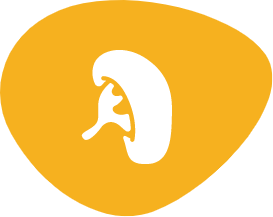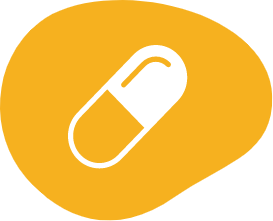SWITCH PATIENT STUDY
What was the main goal of the study?
To see if patients switching to Cerdelga did as well as patients taking anenzyme replacement therapy (ERT) at 12 months
What was the study measuring?
Stability in all of the following measures: spleen size, liver size, hemoglobin levels, and platelet levels
Who participated in the study?
159 patients (18 years or older) with Gaucher disease type 1 who were previously stable on ERT
How was the study designed?

- Patients were randomly selected to receive Cerdelga or imiglucerase (ERT)
- For every 2 patients who received Cerdelga, 1 patient received imiglucerase (106 patients were taking Cerdelga and 53 were taking imiglucerase)
- The study was open-label, which meant the doctors and patients knew which treatment the patients were receiving
How long was the study?
- The first part of the study lasted 12 months (primary analysis)
- Some patients continued with the study for up to 24 months or 2 years. During this extension, all patients were treated with Cerdelga (152 patients continued the study)
- Some patients were observed for up to 48 months or 4 years
Most patients taking Cerdelga remained stable.
-
ERT switch study primary analysis results
(106 patients treated with Cerdelga, 53 patients treated with imiglucerase)
At 12 months of treatment, this study successfully showed that Cerdelga is no less effective than ERT. There were no clinically meaningful differences between patients receiving Cerdelga vs ERT for any of the 4 measures (spleen volume, liver volume, hemoglobin levels, platelet levels).
94%
of patients who had remained on ERT
ERT switch study primary analysis results
(106 patients treated with Cerdelga, 53 patients treated with imiglucerase)
At 12 months of treatment, this study successfully showed that Cerdelga is no less effective than ERT. There were no clinically meaningful differences between patients receiving Cerdelga vs ERT for any of the 4 measures (spleen volume, liver volume, hemoglobin levels, platelet levels).
94%
of patients who had remained on ERT
-
Long-term, open-label extension phase study results
(141 patients treated with Cerdelga)
After 12 months of treatment, patients on Cerdelga remained stable after switching from an ERT.
85%
of patients (120/141) remained stable after 1 year

When evaluated at 2 years in the long-term, open-label extension phase of the study, most patients who continued taking Cerdelga remained stable.
86%
of patients (111/129) remained stable after 2 years of Cerdelga treatment
Long-term, open-label extension phase study results
(141 patients treated with Cerdelga)
After 12 months of treatment, patients on Cerdelga remained stable after switching from an ERT.
85%
of patients (120/141) remained stable after 1 year

When evaluated at 2 years in the long-term, open-label extension phase of the study, most patients who continued taking Cerdelga remained stable.
86%
of patients (111/129) remained stable after 2 years of Cerdelga treatment
-
Switch study safety*
The most common side effects
(occurring in >5% patients) with Cerdelga (eliglustat)No new safety signals were observed in the long-term extension period.
*The Switch Patient Study was not designed to support comparative claims for Cerdelga for the adverse reactions reported in this table.n=sample size.
Switch study safety*
The most common side effects
(occurring in >5% patients) with Cerdelga (eliglustat)No new safety signals were observed in the long-term extension period.
*The Switch Patient Study was not designed to support comparative claims for Cerdelga for the adverse reactions reported in this table.n=sample size.
Ask your doctor if you have questions about Cerdelga.
PREVIOUSLY UNTREATED PATIENT STUDY
Efficacy and safety in previously untreated patients who started treatment with Cerdelga
What was the main goal of the study?
To see if patients not on prior therapy had reduction in the size of their spleen while taking Cerdelga at 9 months
What was the study measuring?
Change in spleen size, liver size, hemoglobin levels, and platelet count
Who participated in the study?
40 patients (16 years or older) with Gaucher disease type 1 who had not received treatment within the past 6 to 9 months or who had never been on treatment
How was the study designed?

Patients were randomly selected to receive Cerdelga or placebo (a sugar pill)
Half of the patients received Cerdelga (n=20) and the other half received placebo (n=20)
The study was double-blind, which meant no one working on the study, doctors or patients, knew which treatment patients were receiving (Cerdelga or placebo)
How long was the study?
-svg-(1).png/jcr:content/study%20length%20icon%20(1)-svg%20(1).png 400w)
The first part of the study lasted 9 months (primary analysis)
Some patients continued the study for up to 24 months or 2 years. During this time, called the open-label extension phase, patients in the placebo group had the opportunity to switch to Cerdelga; 39 of 40 patients continued in the study. All patients in the extension phase were treated with Cerdelga.
Cerdelga significantly improved organ and blood parameters in previously untreated patients 16 years and older with Gaucher disease type 1.
-
Patients treated with Cerdelga (n=20) compared with patients taking placebo (n=20) at 9 months:
28% reduction in spleen size with Cerdelga vs 2% increase with placebo
5.2% reduction in liver size with Cerdelga vs 1.4% increase with placebo
0.7 g/dL increase in hemoglobin levels with Cerdelga vs 0.5 g/dL decrease with placebo
32% increase in platelet levels with Cerdelga vs 9% decrease with placebo
n=sample size.
Patients treated with Cerdelga (n=20) compared with patients taking placebo (n=20) at 9 months:
28% reduction in spleen size with Cerdelga vs 2% increase with placebo
5.2% reduction in liver size with Cerdelga vs 1.4% increase with placebo
0.7 g/dL increase in hemoglobin levels with Cerdelga vs 0.5 g/dL decrease with placebo
32% increase in platelet levels with Cerdelga vs 9% decrease with placebo
n=sample size.
-
Patients treated with Cerdelga (n=38) when evaluated at 2 years:
In the long-term, open-label extension phase, patients taking Cerdelga showed the following changes in spleen and liver size and in hemoglobin and platelet levels:
51% reduction in spleen size
16% reduction in liver size
1.3 g/dL increase in hemoglobin levels
65.3% increase in platelet levels
Patients were observed for up to 4.5 years.
n=sample size.
Patients treated with Cerdelga (n=38) when evaluated at 2 years:
In the long-term, open-label extension phase, patients taking Cerdelga showed the following changes in spleen and liver size and in hemoglobin and platelet levels:
51% reduction in spleen size
16% reduction in liver size
1.3 g/dL increase in hemoglobin levels
65.3% increase in platelet levels
Patients were observed for up to 4.5 years.
n=sample size.
-
Previously untreated study safety
The most common side effects
(occurring in ≥10% patients) with Cerdelga (eliglustat)- Zero patients discontinued the study due to side effects in the primary analysis period
- No new safety signals were observed in the long-term extension period
n=sample size.
Previously untreated study safety
The most common side effects
(occurring in ≥10% patients) with Cerdelga (eliglustat)- Zero patients discontinued the study due to side effects in the primary analysis period
- No new safety signals were observed in the long-term extension period
n=sample size.
Ready to start Cerdelga?
Most adult patients with Gaucher disease type 1 are eligible for Cerdelga.
Need support along your journey?
Sanofi is committed to supporting patients with Gaucher disease type 1.
Indication
CERDELGA is a prescription medicine used for the long-term treatment of Gaucher disease type 1 (GD1) in adults who are CYP2D6 extensive metabolizers (EMs), intermediate metabolizers (IMs), or poor metabolizers (PMs) as detected by an FDA-cleared test. Your doctor will perform a test to make sure that CERDELGA is right for you.
Limitations of Use:
- CYP2D6 ultra-rapid metabolizers may not achieve adequate concentrations of CERDELGA to achieve a therapeutic effect.
- A specific dose cannot be recommended for CYP2D6 indeterminate metabolizers.
Important Safety Information
Certain patients should not use CERDELGA based on their CYP2D6 metabolizer status due to an increased risk of side effects, including heart problems. Do not use CERDELGA if you are:
- An Extensive Metabolizer (EM) taking a medicine that is a strong or moderate CYP2D6 inhibitor along with another medicine that is a strong or moderate CYP3A inhibitor, an EM with moderate or severe liver problems, or an EM with mild liver problems and taking a medicine that is a strong or moderate CYP2D6 inhibitor.
- An Intermediate Metabolizer (IM) taking a medicine that is a strong or moderate CYP2D6 inhibitor along with another medicine that is a strong or moderate CYP3A inhibitor, an IM taking a medicine that is a strong CYP3A inhibitor, or an IM with any degree of liver problems.
- A Poor Metabolizer (PM) taking a medicine that is a strong CYP3A inhibitor, or a PM with any degree of liver problems.
Your doctor will perform a test to help determine if CERDELGA is right for you.
CERDELGA can affect the way other medicines work and other medicines can affect how CERDELGA works. Using CERDELGA with other medicines or herbal supplements may cause an increased risk of side effects, including changes in electrical activity of your heart (ECG changes) and irregular heart beat (arrhythmias). Especially tell your doctor if you take St. John's Wort, or medicines for fungal infections, tuberculosis, seizures, heart conditions, high blood pressure, or depression or other mental health problems. Your doctor may need to prescribe a different medicine, change your dose of other medicines, or change your dose of CERDELGA. Tell your doctor about all of the medicines you take, including prescription and over-the-counter medicines, vitamins, and herbal supplements before you start taking them.
Before taking CERDELGA, tell your doctor about all of your medical conditions, including heart problems (including a condition called long QT syndrome), a history of heart attack, kidney or liver problems. If you are pregnant or plan to become pregnant or breastfeed, talk to your doctor. It is not known if CERDELGA will harm your unborn baby. Talk to your doctor if you are breastfeeding or planning to breastfeed. It is not known if CERDELGA passes into your breast milk. You and your doctor will decide if you should take CERDELGA or breastfeed. You should not do both.
CERDELGA, used with certain other medicines, may cause changes in the electrical activity of your heart (ECG changes) and irregular heart beat (arrhythmias). Tell your doctor if you have new symptoms such as palpitations, fainting, or dizziness.
The most common side effects (≥10%) of CERDELGA include: tiredness, headache, nausea, diarrhea, back pain, pain in extremities, and upper abdominal pain. Call your doctor for medical advice about adverse effects.
Tell your doctor if you have any side effect that bothers you or that does not go away. These are not all the possible side effects of CERDELGA. Call your doctor for medical advice about side effects.
It is not known if CERDELGA is safe and effective in children.
Please see the full Prescribing Information, including the Patient Medication Guide, for CERDELGA.
Indication
CERDELGA is a prescription medicine used for the long-term treatment of Gaucher disease type 1 (GD1) in adults who are CYP2D6 extensive metabolizers (EMs), intermediate metabolizers (IMs), or poor metabolizers (PMs) as detected by an FDA-cleared test. Your doctor will perform a test to make sure that CERDELGA is right for you.
Limitations of Use:
- CYP2D6 ultra-rapid metabolizers may not achieve adequate concentrations of CERDELGA to achieve a therapeutic effect.
- A specific dose cannot be recommended for CYP2D6 indeterminate metabolizers.
Important Safety Information
Certain patients should not use CERDELGA based on their CYP2D6 metabolizer status due to an increased risk of side effects, including heart problems. Do not use CERDELGA if you are:
- An Extensive Metabolizer (EM) taking a medicine that is a strong or moderate CYP2D6 inhibitor along with another medicine that is a strong or moderate CYP3A inhibitor, an EM with moderate or severe liver problems, or an EM with mild liver problems and taking a medicine that is a strong or moderate CYP2D6 inhibitor.
- An Intermediate Metabolizer (IM) taking a medicine that is a strong or moderate CYP2D6 inhibitor along with another medicine that is a strong or moderate CYP3A inhibitor, an IM taking a medicine that is a strong CYP3A inhibitor, or an IM with any degree of liver problems.
- A Poor Metabolizer (PM) taking a medicine that is a strong CYP3A inhibitor, or a PM with any degree of liver problems.
Your doctor will perform a test to help determine if CERDELGA is right for you.
CERDELGA can affect the way other medicines work and other medicines can affect how CERDELGA works. Using CERDELGA with other medicines or herbal supplements may cause an increased risk of side effects, including changes in electrical activity of your heart (ECG changes) and irregular heart beat (arrhythmias). Especially tell your doctor if you take St. John's Wort, or medicines for fungal infections, tuberculosis, seizures, heart conditions, high blood pressure, or depression or other mental health problems. Your doctor may need to prescribe a different medicine, change your dose of other medicines, or change your dose of CERDELGA. Tell your doctor about all of the medicines you take, including prescription and over-the-counter medicines, vitamins, and herbal supplements before you start taking them.
Before taking CERDELGA, tell your doctor about all of your medical conditions, including heart problems (including a condition called long QT syndrome), a history of heart attack, kidney or liver problems. If you are pregnant or plan to become pregnant or breastfeed, talk to your doctor. It is not known if CERDELGA will harm your unborn baby. Talk to your doctor if you are breastfeeding or planning to breastfeed. It is not known if CERDELGA passes into your breast milk. You and your doctor will decide if you should take CERDELGA or breastfeed. You should not do both.
CERDELGA, used with certain other medicines, may cause changes in the electrical activity of your heart (ECG changes) and irregular heart beat (arrhythmias). Tell your doctor if you have new symptoms such as palpitations, fainting, or dizziness.
The most common side effects (≥10%) of CERDELGA include: tiredness, headache, nausea, diarrhea, back pain, pain in extremities, and upper abdominal pain. Call your doctor for medical advice about adverse effects.
Tell your doctor if you have any side effect that bothers you or that does not go away. These are not all the possible side effects of CERDELGA. Call your doctor for medical advice about side effects.
It is not known if CERDELGA is safe and effective in children.
Please see the full Prescribing Information, including the Patient Medication Guide, for CERDELGA.



